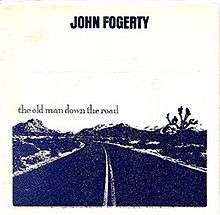The Old Man Down the Road
"The Old Man Down the Road" is a song by American rock artist John Fogerty. It was released in December 1984 as the lead single from Fogerty's comeback album, Centerfield. It became a top 10 hit single, peaking at number 10 on the US Billboard Hot 100, and spending three weeks at the number-one spot on the Billboard Top Rock Tracks chart.[1] Rolling Stone Album Guide critic Paul Evans regards the song as "functional swamp rock".[2]
| "The Old Man Down the Road" | ||||
|---|---|---|---|---|
 | ||||
| Single by John Fogerty | ||||
| from the album Centerfield | ||||
| B-side | "Big Train (From Memphis)" | |||
| Released | December 1984 | |||
| Recorded | 1984 | |||
| Genre | Rock | |||
| Length | 3:32 | |||
| Label | Warner Bros. | |||
| Songwriter(s) | John Fogerty | |||
| Producer(s) | John Fogerty | |||
| John Fogerty singles chronology | ||||
| ||||
Music video
The video for the song features what appears to be, through a little trickery, an extended single camera sequence that follows a very long electric guitar cord through various scenes. Fogerty appears briefly throughout the video, both as himself and at least two other characters (i.e. the character at the very beginning of the video and the man walking along the road with his jacket over his shoulder midway through the video.)
Charts
| Chart (1984-85) | Peak position |
|---|---|
| Australia (ARIA)[3] | 10 |
| Austria (Ö3 Austria Top 40)[4] | 12 |
| Belgium (Ultratop 50 Flanders)[5] | 22 |
| Canada Top Singles (RPM) | 12 |
| Netherlands (Single Top 100)[6] | 35 |
| New Zealand (Recorded Music NZ)[7] | 11 |
| Switzerland (Schweizer Hitparade)[8] | 27 |
| UK Singles (The Official Charts Company) | 90 |
| US Billboard Hot 100 | 10 |
| US Billboard Top Rock Tracks | 1 |
| West Germany (Official German Charts)[9] | 49 |
Lawsuit
Saul Zaentz, owner of Fantasy Records claimed that "The Old Man Down the Road" shared the same chorus as "Run Through the Jungle", a song from Fogerty's days with Creedence Clearwater Revival years before. (Fogerty had relinquished copyrights and publishing rights of his Creedence songs to Zaentz and Fantasy, in exchange for release from his contractual obligations to them.) Zaentz sued (Fantasy, Inc. v. Fogerty) but the defendant Fogerty ultimately prevailed when he showed that the two songs were whole, separate and distinct compositions. Bringing his guitar to the witness stand, he played excerpts from both songs, demonstrating that many songwriters (himself included) have distinctive styles that can make different compositions sound similar to less discerning ears.[10]
After prevailing as defendant, Fogerty asked the court to require Zaentz to pay for the attorney fees he had spent to defend himself against the copyright infringement claim. In such (copyright) cases, the Court of Appeals for the Ninth Circuit required prevailing defendants seeking recompense were bound to show that original suit was frivolous or made in bad faith. This case, Fogerty v. Fantasy, Inc., became precedent when the U.S. Supreme Court (1993) overturned lower court rulings and decided that Fogerty could be awarded attorneys' fees without having to show that Zaentz's original suit was frivolous. The lower courts then decided that Fogerty should have his attorney fees, totalling $1,347,519.15. [11]
References
- Whitburn, Joel (2004) The Billboard Book of Top 40 Hits, 8th Edition (Billboard Publications), page 232.
- Evans, Paul (1992). Brackett, Nathan; Hoard, Christian (eds.). The New Rolling Stone Album Guide (4th ed.). Fireside. p. 306. ISBN 0743201698.
- "Australian-charts.com – John Fogerty – The Old Man Down the Road". ARIA Top 50 Singles.
- "Austriancharts.at – John Fogerty – The Old Man Down the Road" (in German). Ö3 Austria Top 40.
- "Ultratop.be – John Fogerty – The Old Man Down the Road" (in Dutch). Ultratop 50.
- "Dutchcharts.nl – John Fogerty – The Old Man Down the Road" (in Dutch). Single Top 100.
- "Charts.nz – John Fogerty – The Old Man Down the Road". Top 40 Singles.
- "Swisscharts.com – John Fogerty – The Old Man Down the Road". Swiss Singles Chart.
- "Offiziellecharts.de – John Fogerty – The Old Man Down the Road". GfK Entertainment Charts. Retrieved May 28, 2019.
- "The Time John Fogerty Was Sued for Ripping Off John Fogerty". Mental Floss. Retrieved 16 August 2013.
- "FANTASY INC. v. FOGERTY". Findlaw. Retrieved 29 March 2020.